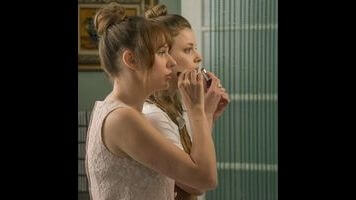“The Date” begins with Mickey lying to her AA group, to a former sober confidante and ends with her being honest to herself for the first time. She refuses to let the rest of her AA meeting know that she’s fallen off the wagon significantly and even battles with pressing that restart button on her sobriety app. Let’s repeat that again: She has trouble revealing to her iPhone that she’s not sober. So if she can’t even say to phone that she’s not sober, admitting to herself she doesn’t just want Gus around because she thinks he’ll be fun at parties. But as she’s experiencing personal chaos, she’s figured out she can gain a modicum of control by setting up Bertie and Gus on a date that neither of them want to go on. She’s unhappy and restless until she gets to participate in their pairing, first by inserting herself in Bertie’s pre-date prep and then commenting on Gus’ restaurant choice (the Yelp reviews!). She continues her meddling through her text message puppeteering. When Mickey is out of control – when she is alone and there is no one to play with – she’s a mess, not even being able to masturbate in the presence of the cat (“Grandpa! Stop eating yourself out!”). But as soon as she gets a chance to have some kind of control, she relishes the opportunity, playing both Gus and Bertie against each other, until they both admit they know what’s going on. She could have ended the whole thing with “Go easy on her,” or even “Hey, maybe don’t fuck with my roommate, she made an honest mistake.” Instead she continues to manipulate two people who are too nice to say no.
Niceness is interesting concept in Love. Mickey decides that Berties and Gus are perfect together because they are both so nice. But what Love has done is show that nice isn’t always good, nor is it enough of a personality point for people to form a bond over. Instead, it’s a squishy, subjective word that doesn’t ultimately mean anything. Natalie has thrown the idea of hostile kindness at Gus, and that phrase has defined his character for me, as it defines where the date with Bertie really goes downhill. She says she’s cold, almost more of an observation than claim. He convinces her she’s bothered by the table next to them, featuring a very loud Ian Roberts discussing the merits of shrimp. Gus rebuffs the kindness of Will Sasso’s sweet server, and then he has them move to a worse table all in the service of Bertie who doesn’t really care in the first place. There’s a parallelism between the Ian Roberts table and Bertie and Gus’ date. At first, Gus and Bertie bond by making fun of Roberts’ table. They have some sort of upper hand that only they know about. Then, Gus’ hostile kindness comes out in full force when he figures out they’re having a much better time than he and Bertie are. Roberts’ blowhard and his date are laughing. They actually like each other. After their initial bonding moment, they only time Gus and Bertie seem at all happy together is when they’re talking about Mickey, a person they like considerably more than they like each other.
Their scenes together are perfect, running the comedic gamut. At first they are sweet and flirty. As the date progresses though, it descends stomach-churningly awkward, capped off with “It’s the perfect level of bloody” in reference to Bertie’s steak. But then the type of comedy changes mid-date. It’s no longer cringe-comedy, it’s straight up one upmanship and both Bertie and Gus happen to be good at it. “Fuck that! I don’t support the troops,” Bertie says after lying about being a 9/11 truther in order to make Gus uncomfortable. It’s a masterful scene between the two of them, so wonderfully written by Apatow and Rust. I was almost upset when their dated ended, although if that was the only to get the line “Anyway, I miss chubby guys,” then it was worth it.
The concept of niceness returns again then in two ways: The first is from Syd (Kerri Kenney, who I’m loving in her cameos), who says she only met her husband when she decided she needed a nice “guy.” Mickey has a look of recognition. She had a nice guy. She made the nice guy go on a date with her roommate. It comes up again at the end, as well when, ironically Gus declares he’s not a nice guy. “I’m not just some nice guy who’s always going be around for you to fuck with,” he tells her. But, with one kiss, she makes sure he is.









































